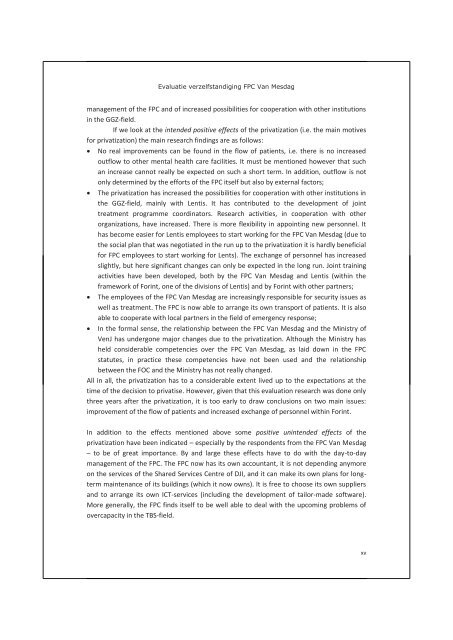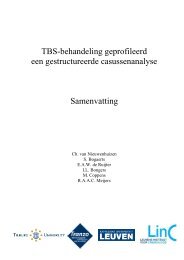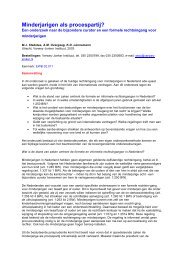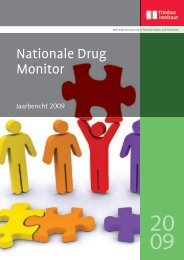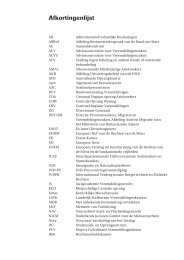Evaluatie van de verzelfstandiging van het FPC Dr. S. van Mesdag
Evaluatie van de verzelfstandiging van het FPC Dr. S. van Mesdag
Evaluatie van de verzelfstandiging van het FPC Dr. S. van Mesdag
- No tags were found...
You also want an ePaper? Increase the reach of your titles
YUMPU automatically turns print PDFs into web optimized ePapers that Google loves.
<strong>Evaluatie</strong> <strong>verzelfstandiging</strong> <strong>FPC</strong> Van <strong>Mesdag</strong>management of the <strong>FPC</strong> and of increased possibilities for cooperation with other institutionsin the GGZ-field.If we look at the inten<strong>de</strong>d positive effects of the privatization (i.e. the main motivesfor privatization) the main research findings are as follows: No real improvements can be found in the flow of patients, i.e. there is no increasedoutflow to other mental health care facilities. It must be mentioned however that suchan increase cannot really be expected on such a short term. In addition, outflow is notonly <strong>de</strong>termined by the efforts of the <strong>FPC</strong> itself but also by external factors; The privatization has increased the possibilities for cooperation with other institutions inthe GGZ-field, mainly with Lentis. It has contributed to the <strong>de</strong>velopment of jointtreatment programme coordinators. Research activities, in cooperation with otherorganizations, have increased. There is more flexibility in appointing new personnel. Ithas become easier for Lentis employees to start working for the <strong>FPC</strong> Van <strong>Mesdag</strong> (due tothe social plan that was negotiated in the run up to the privatization it is hardly beneficialfor <strong>FPC</strong> employees to start working for Lents). The exchange of personnel has increasedslightly, but here significant changes can only be expected in the long run. Joint trainingactivities have been <strong>de</strong>veloped, both by the <strong>FPC</strong> Van <strong>Mesdag</strong> and Lentis (within theframework of Forint, one of the divisions of Lentis) and by Forint with other partners; The employees of the <strong>FPC</strong> Van <strong>Mesdag</strong> are increasingly responsible for security issues aswell as treatment. The <strong>FPC</strong> is now able to arrange its own transport of patients. It is alsoable to cooperate with local partners in the field of emergency response; In the formal sense, the relationship between the <strong>FPC</strong> Van <strong>Mesdag</strong> and the Ministry ofVenJ has un<strong>de</strong>rgone major changes due to the privatization. Although the Ministry hasheld consi<strong>de</strong>rable competencies over the <strong>FPC</strong> Van <strong>Mesdag</strong>, as laid down in the <strong>FPC</strong>statutes, in practice these competencies have not been used and the relationshipbetween the FOC and the Ministry has not really changed.All in all, the privatization has to a consi<strong>de</strong>rable extent lived up to the expectations at t<strong>het</strong>ime of the <strong>de</strong>cision to privatise. However, given that this evaluation research was done onlythree years after the privatization, it is too early to draw conclusions on two main issues:improvement of the flow of patients and increased exchange of personnel within Forint.In addition to the effects mentioned above some positive uninten<strong>de</strong>d effects of theprivatization have been indicated – especially by the respon<strong>de</strong>nts from the <strong>FPC</strong> Van <strong>Mesdag</strong>– to be of great importance. By and large these effects have to do with the day-to-daymanagement of the <strong>FPC</strong>. The <strong>FPC</strong> now has its own accountant, it is not <strong>de</strong>pending anymoreon the services of the Shared Services Centre of DJI, and it can make its own plans for longtermmaintenance of its buildings (which it now owns). It is free to choose its own suppliersand to arrange its own ICT-services (including the <strong>de</strong>velopment of tailor-ma<strong>de</strong> software).More generally, the <strong>FPC</strong> finds itself to be well able to <strong>de</strong>al with the upcoming problems ofovercapacity in the TBS-field.xv


